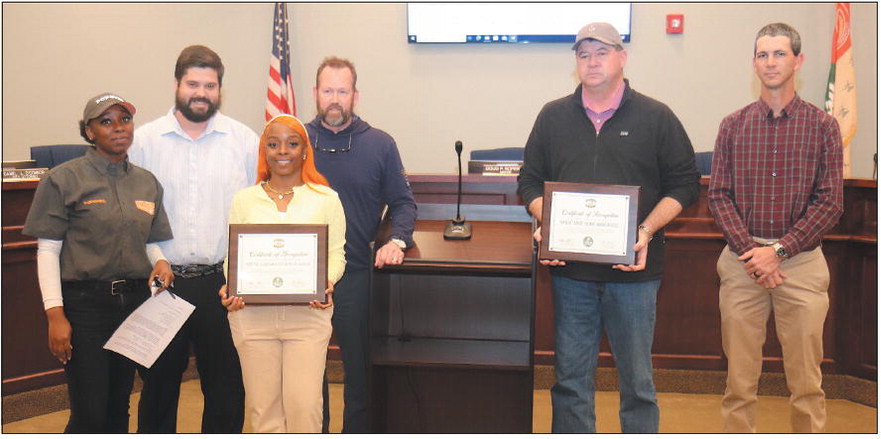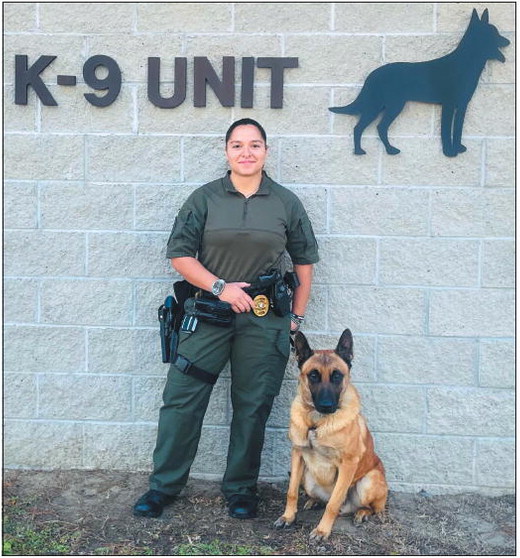Animal Control & Local Rescues Weigh In On Proposed Ordinance
Vidalia Animal Control Officer April Braddy, Sweet Onion Animal Protection Society (SOAPS) CEO and President Therisa Ingley, and other local rescue operation officials and animal lovers spoke to the Vidalia City Council about the proposed new animal control ordinance during a public hearing on Tuesday, August 26.
This new ordinance was first proposed during the last meeting of the Council on Monday, August 11. This proposed ordinance continued from page
would replace any previous animal control ordinances, and would set the standard for how the City handles animal complaints and issues. The ordinance reads that its purpose is to “protect public safety by requiring responsible care of dogs, cats, and other pets, as well as preventing dog attacks and ensuring responsible ownership of dogs in the city of Vidalia.”
The potential legislation requires all dogs and cats kept within the city to have active rabies vaccinations, and states that all dogs must be kept under restraint at all times within the city to keep them from running throughout the streets or posing a threat to the public. These restraints may be leashes (6 feet long or less) that are controlled by a responsible person when the dog is off the owner’s property, and fences or enclosures on the property.
Animal nuisances are also prohibited in the proposed ordinance – this meaning, no animal can habitually bark, howl, whine, or make other disturbing noises that bother neighbors, especially from 10 p.m. until 7 a.m.; cause property damage through digging and scratching; habitually roam and trespass; scatter trash; chase pedestrians, bicyclists, or vehicles in a threatening manner; or cause unclean conditions that emit offensive odors or attract pests. In addition to this, pet owners cannot have more than 8 dogs or cats if all animals are spayed and neutered, and can have no more than 4 adult dogs or cats if unneutered.
Owners also cannot neglect animals under this ordinance. Examples of this neglect are failure to provide basic needs, such as clean water, sufficient food, sanitary and protective shelter, and necessary medical care; unsanitary and overcrowded conditions; and abandonment of an animal without food, water, or supervision for more than 24 hours without providing reasonable provision for its care. Cruelty and improper tethering are also outlawed by this ordinance.
According to the proposed ordinance, dogs running at-large in the city will be impounded by the city. Upon impoundment, officials will attempt to identify the owner through microchip or tags to notify them of the impoundment. The dog may be reclaimed by providing proof of ownership, paying all impoundment fees, and showing compliance with the ordinance. If an owner is not identified or if the dog is not reclaimed after 20 days, the dog may be put up for adoption or humanely euthanized.
City Attorney Daniel O’Connor began the public hearing by explaining how this new ordinance originated. “[City Manager] Josh [Beck] and I met and decided to update our animal control ordinance. When I was directing this, I had one perspective, but I know you all may have a different one, and that’s why we welcome your input,” he explained. “The main thing that was my background as a municipal judge is cases with dogs that attacked other people’s pets off their property and dog bite cases where there was very little that could be done as far as enforcing it. We had a dog running loose ordinance that made people pay a $150 fine, but that was essentially all that could be done about it. So, that was a big motivator to move forward with this.”
O’Connor shared that the new ordinance still had many of the same guidelines as the current ordinance, but was more specific on the classification of dangerous and potentially dangerous dogs, as well as ways that officials may intervene with dog cases before someone is bitten. He said that there had been several issues with dogs in the city, including during the Vidalia Onion Run, when dogs chased many runners. O’Connor stated that in these cases, the city continued from page
wishes to be proactive and deal with the issue before someone is bitten – they will not take the dog away, but will classify the dog and impose additional safety requirements.
He also informed attendees that when drafting the new ordinance, he and Beck had looked at other cities’ animal ordinances in an effort to gain some insight and clarity on how to handle the issues. “We appreciate the feedback. If there is anything specific that you see that maybe doesn’t work in practice or interferes with something that SOAPS or someone that deals with animals mainly does not think will work in practice, we want to know that,” O’Connor emphasized.
Beck also spoke on the potential legislation, as he said that many individuals within the City’s departments had commented on the portion of the ordinance which states that animal control will hold dogs who have been running at-large for 20 days. “There has been some people who suggest that we do 10 days, which is what we currently have in our existing ordinance, so we are taking into consideration changing the twenty-day threshold into ten days. So far, that is the only comments we have gotten,” he remarked.
SOAPS CEO and President Therisa Ingley also addressed this provision in the ordinance. “First of all, I want to commend y’all for addressing this. I’m very proud of the city of Vidalia for recognizing that there is a huge problem with animal control in our area – not just Vidalia, but the whole area,” she emphasized. “If someone has an animal that is their pet, the staterequired minimum 10 day hold is plenty time for those people to come to get their animal. If you go beyond that, it does back animal control up, and they run out of space. Then, we get called and we have no space. I don’t think there needs to be a maximum hold – especially if the dog is adoptable and [the shelter] has plenty of room, by all means, keep the animal as long as you can. But ten days is plenty of time to hold the animals for the owners.”
Ingley then addressed the animal issue within the city to the Council. “I don’t think our community really understands the problems that are here that animal control and rescues face. So far, this year, our organization has rescued and rehomed – since January – right at 500 animals. And when the [animal shelter] gets full, they have no option but to tell people to call us, but we are at that point [of being full] now, too,” she shared. “Nationwide, animals aren’t moving like they did 5 years ago. We used to move 1,500 animals a year without a problem. We are down to around 1,000 animals a year – which is still good – but its’ not keeping up with demands. I think one of the things we need to look at is if there is anyway that the city, in the future, can aim towards doing spay/neuter. Our organization offers spay and neutering of any cat for $35 and any dog for $50. That’s all the owner has to pay – we cover the rest of that. Last year, we issued vouchers for right at 962 animals. 678 of those vouchers were used, so that’s 678 animals in our community that aren’t reproducing anymore because SOAPS helped cover the cost of having them done. So far this year, we’ve issued 822 vouchers; I don’t know how many have been used.” She added, “If the city can help us with that financially, if they can help us by maybe including an ordinance later that if you have breeding animals then you need to have them spayed and neutered, then that would be something critical to helping the problem we have.”
Mayor Doug Roper asked Ingley if she would recommend mandated all pets be spayed or neutered, or if this should merely apply to adopted pets. Ingley informed Roper that state law mandates that any animal that is adopted from an animal shelter or rescue must then be spayed or neutered. “If we had the resources here to say, ‘the dog can’t leave the shelter until spayed or neutered,’ that would be wonderful, but we just don’t have the infrastructure as far as even vets go. There definitely needs to be a follow-up on every animal adopted from the shelter to make sure that they are spayed or neutered,” she explained. “In the state of Georgia, it is illegal for you to breed and sell more than 1 litter of puppies per year. So, really, anybody that has breeding dogs – because you know they’re not going to keep having puppies unless they can find a way to get rid of them – should be having their animals spayed or neutered.”
Roper also asked Ingley for her thoughts on why the moving of animals had slowed down over the past few years. Ingley said that she felt like there were several contributing factors, including the economy – as people do not have extra money to own and provide for pets – and the large population of animals, which is continuously growing.
City Attorney O’Connor asked Ingley how she felt the community would respond if the city imposed a spay/neuter mandate. Ingley replied, sharing a quote from her friend Louie Powell, who when discussing animal control several years ago told her, “Nobody thinks animals are a problem until they’re their problem.”
Ingley elaborated on this, saying, “Until you have 43 dogs show up at your house, tear up your yard, chase your child, kill your cat, [or] bite someone, you don’t think there’s a problem. So, I think the vast majority of people are going to say, ‘That’s not my problem.’ They don’t realize that it becomes their problem because these animals aren’t going to stay in one location… Eventually, they’re going to end up in your yard and something bad is going to happen. So, I think initially, the community will critique – part of the community will act heavily with that – but it needs to be presented and sold in a way that this is for evcontinued from page
A
eryone’s protection. People don’t like speed limits and they speed and get fined – but it’s for people’s protection. It’s there for a reason.”
When asked if there should be any exceptions to this potential mandate, Ingley stated that she had heard many reasonings for not wanting to spay or neuter animals over the years, but felt that exceptions should only be made if a viable, well-stated reason for not doing so is presented to the city. She emphasized that individuals who breed animals should have a breeder’s license, which would exempt them from the spay and neuter policy.
She continued, as she also addressed state law regarding stray animals. “First of all, [SOAPS] can’t pick up stray animals. It is against the law in Georgia for people to pick up stray animals,” she remarked, as she explained that only animal control or law enforcement could lawfully pick up the animals.
She also shared that individuals who pick up stray animals or begin feeding stray animals must continue to care for the animal for at least 10 days by law. “If you don’t and you give it away or do something else with it, legally, it may be considered stolen property. Because if it’s someone’s dog and you gave it away, you can be legally prosecuted for that. But here’s the difference: say you keep it 14 days: then, legally, it’s your dog,” Ingley said. “There was a case here several months ago where a lady was feeding a dog that showed up at her house out of the kindness of her heart, and a runner came by and the dog bit him. It wasn’t really her dog – she just felt sorry for it and has been feeding it for around 3 weeks. It went to court and she was required to pay his medical bills – though that was never her dog.”
Vidalia Animal Control Officer April Braddy also weighed in on this issue, as she shared that most of the multitude of animals running within the city came from people who picked the animals up beside the road outside the city limits. “People are picking up animals from outside of the city, and bringing them to their homes in Vidalia. They see these puppies and dogs by the road, pick them up, and bring them home. Around 90% of the people who say that they found the animal in the Walmart parking lot did not find the animal in the Walmart parking lot. They found in between Baxley and Hazlehurst on their way home and put it in their car. So, that’s where a lot of our excessive numbers of strays are coming from,” she told the Council.
Braddy gave an example of two dogs that are currently roaming a Vidalia neighborhood and have become a nuisance to individuals living in that area. These dogs were picked up from the side of the road between Hazlehurst and Baxley and brought to a home in the neighborhood. The individuals who picked the dogs up have since contacted animal control to come seize the animals, but Braddy said that the animal shelter currently has no room for more animals, as she stated that she informed the individuals that they would have to rehome the dogs themselves.
“We have a bunch of instances of that,” Braddy emphasized.
City Councilman Ronald Miller shared that he felt that there needed to be a maximum amount of animals allowed per pet owner, just as the proposed ordinance provided. City Manager Beck commented on this, saying, “Our department heads struggled with the amount of animals – if 8 is too much or too little.”
A citizen whom volunteers with a local rescue spoke up, saying that she agreed that allowing citizens to have 8 dogs was an excessive amount, as most individuals with that many animals did not adequately take care of them. She explained that she believed there was a previous city ordinance that only allowed residents to have 5 dogs, but those 5 dogs should be spayed and neutered because each dog may have 2 litters a year and up to 10 litters in a lifetime.
“If you have two dogs that aren’t fixed and they breed, they can have 30 puppies; the next year, they can have even more puppies – it’s a snowball,” the citizen said.
Citizen Connie Williams also spoke up about the animal control ordinance, as she emphasized the need for fines to be enforced for infractions against the ordinance. “People who let their animals roam around – those people should be fined. When they hit a person in the pocket, they hear that,” she remarked.
Discussion continued throughout the night, as rescues and citizens shared their desires to see the Vidalia Animal Shelter renovated and hoped for improvement with the animal issue in the future.
At the conclusion of the public hearing, City Manager Beck stated, “We will make the amendments. If there is not a lot of amendments, we will have our second reading – our final reading – at our September council meeting on Monday, September 8.”
The full proposed ordinance details guidelines for handling dog attacks, and classifies dogs based on their level of danger to the public. The complete ordinance is available for review by contact Vidalia City Hall at (912) 537-7661.





